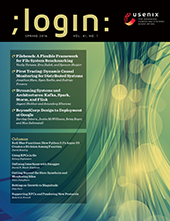USENIX supports diversity, equity, and inclusion and condemns hate and discrimination.
Musings
;login: Enters a New Phase of Its Evolution
For over 20 years, ;login: has been a print magazine with a digital version; in the two decades previous, it was USENIX’s newsletter, UNIX News. Since its inception 45 years ago, it has served as a medium through which the USENIX community learns about useful tools, research, and events from one another. Beginning in 2021, ;login: will no longer be the formally published print magazine as we’ve known it most recently, but rather reimagined as a digital publication with increased opportunities for interactivity among authors and readers.
Since USENIX became an open access publisher of papers in 2008, ;login: has remained our only content behind a membership paywall. In keeping with our commitment to open access, all ;login: content will be open to everyone when we make this change. However, only USENIX members at the sustainer level or higher, as well as student members, will have exclusive access to the interactivity options. Rik Farrow, the current editor of the magazine, will continue to provide leadership for the overall content offered in ;login:, which will be released via our website on a regular basis throughout the year.
As we plan to launch this new format, we are forming an editorial committee of volunteers from throughout the USENIX community to curate content, meaning that this will be a formally peer-reviewed publication. This new model will increase opportunities for the community to contribute to ;login: and engage with its content. In addition to written articles, we are open to other ideas of what you might want to experience.

This time around I thought I would write about the future of the Internet. Please note the capital “I,” as that’s what you will find in the Future Internet Design (FIND) final report, where the authors suggest strategies to the NSF for funding research into networking.
That initial conference took place in 2009 and looked at 49 projects. One outcome of the NSF NeTS FIND Initiative was to continue funding several of the projects. I was vaguely aware of this work, but I also wondered how in the world anyone could hope to change the Internet, the system of networks we’ve all grown to rely upon—really, to depend upon—at this point in time.
On the economic side, there is the issue of sunk costs: companies have spent billions creating the network we have today. Then there is conservatism: people have learned (at least enough) to work with TCP/IP, with all its quirks. And, finally, any new protocols will require hardware support, and that’s the issue I found worried the people whom I talked to about the NSF project I chose to focus on.

